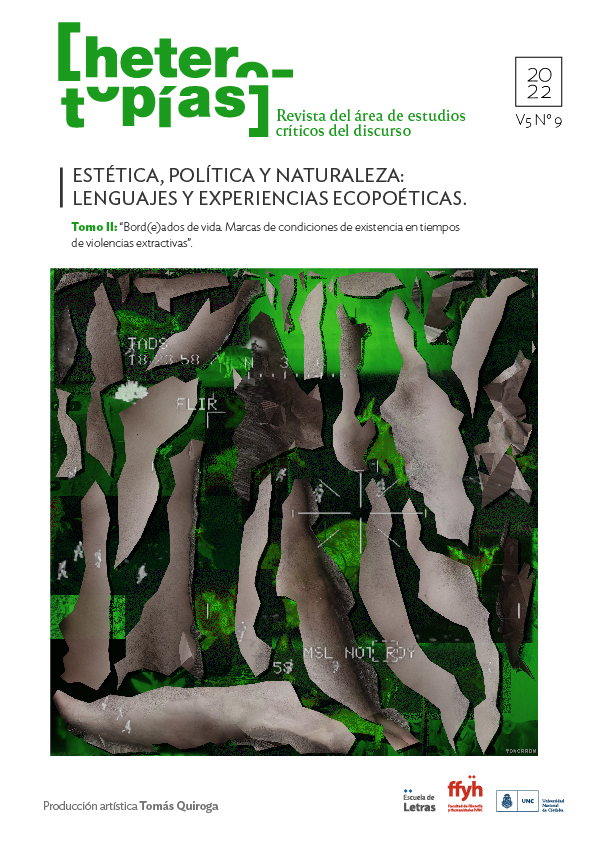Sailings, art, politics and memory in the work of Hilda Zagaglia Interview with the artist
Main Article Content
Abstract
Esta entrevista recupera los principales ejes de su obra, entre ellos, destacamos sus preocupaciones, dolores y respuestas a problemáticas socioambientales. Inspirada en los mitos americanos, en la religiosidad (indígena y judeocristiana) y en la naturaleza local. A lo largo de su vida y obra, Hilda ha creado pinturas, esculturas, grabados, cajas objeto, instalaciones y performances, con múltiples técnicas y perspectivas, para denunciar y no olvidar los distintos momentos que, a lo largo de la historia de América, supusieron la explotación de la tierra y vejaciones en los cuerpos.
Downloads
Article Details

This work is licensed under a Creative Commons Attribution-NonCommercial-ShareAlike 4.0 International License.
Those authors who have publications with this journal, accept the following terms: Those authors who have publications with this journal, accept the following terms:
a. The authors will keep their copyright and guarantee to the journal the right of first publication of their work, which will be simultaneously subject to the Creative Commons Attribution - Non-Commercial - Share Alike (by-nc-sa) Attribution License; no commercial use of the original work or any derivative works is allowed, the distribution of which must be done with a license equal to the one that regulates the original work.
b. Authors may adopt other non-exclusive license agreements for the distribution of the published version of the work (e.g., deposit it in an institutional telematic archive or publish it in a monographic volume) provided that the initial publication in this journal is indicated.
c. Authors are allowed and recommended to disseminate their work through the Internet (e.g. in institutional telematic archives or on their website) before and during the submission process, which may lead to interesting exchanges and increase the number of citations of the published work. (See The effect of open access).
How to Cite
References
Anónimo. (1993). Popol Vuh. Las antiguas historias del Quiché. México: Fondo de Cultura Económica.
Antonelli, M. A., Fobbio, L., Wagner, L. (2021). “Tramas de vida en la América Latina del despojo. Fragmentos de experiencias, tejidos teóricos e invenciones de re-existencia”. Heterotopías, 4(8), disponible en https://revistas.unc.edu.ar/index.php/heterotopias/issue/view/2405
Calveyra, A. (2003). El maizal gregoriano. Buenos Aires: Adriana Hidalgo.
Escobar, T. (2021). Aura latente. Estética/Ética/Política/Técnica. Buenos Aires: Tinta Limón.
Lévi Strauss, C. (1997). El pensamiento salvaje. México: Fondo de Cultura Económica.
Gruzinski, S. (1991). La colonización de lo imaginario. Sociedades indígenas y occidentalización en el México español, siglos XVI-XVIII. México: Fondo de Cultura Económica.
Gruzinski, S. (2007). El pensamiento mestizo. Barcelona: Paidós.
Musitano, A. (2011). “Hilda Zagaglia, la muerte, los muertos, una cartografía americana”. En Musitano, A., Poéticas de lo cadavérico. Teatro, plástica y videoarte de fines del siglo XX (pp. 279-298). Córdoba: Comunicarte.
